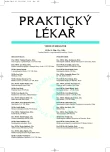Travel medicine in the office of G. P.
Cestovní lékařství v ordinaci praktického lékaře pro dospělé
Cestovní lékařství je nová specializace, která se zabývá prevencí, diagnostikou a léčbou nemocí, které vznikly v souvislosti s cestováním. Až 60 % všech zdravotních komplikací vzniklých při pobytu běžného turisty v zahraničí jsou úrazy. Na druhém místě jsou řazeny infekční nemoci, na třetím psychosociální problémy. Mezi nejčastější importované infekční nemoci „běžných“ cestovatelů, patří tzv. cestovatelský průjem, malárie importovaná ze Západní Afriky cestovateli, kteří neužívali profylaxi, akutní respirační nákazy, virová hepatitida A, horečka dengue, virová hepatitida B a kapavka. Cestovatelé se obávají právě infekčních onemocnění, ty ale způsobují pouze 1–4 % všech úmrtí během cestování.
Cestovatelé si také často neuvědomují, že základními rizikovými faktory, které mohou negativně ovlivnit jejich pobyt v zahraničí jsou komplikace vzniklé v souvislosti s dopravou, především pak letadlem, jako je kinetóza, pásmová nemoc a tromboembolická nemoc. Často nemyslí ani na nejběžnější infekční zdravotní komplikaci, kterou je cestovatelský průjem a podceňují riziko získání malárie, a proto neužívají antimalarickou profylaxi tam, kde je to potřebné. Tím, že cestovatelé začínají více využívat možnosti poradit se před cestou do zahraničí, je vhodné, aby znalosti z oboru mohl klientovi poskytnout i praktický lékař. Kurzy s různou tématikou jsou prováděny Subkatedrou tropické a cestovní medicíny Institutu postgraduálního vzdělávání ve zdravotnictví. Prozatím nejsou bohužel praktickými lékaři nijak hojně navštěvovány.
Klíčová slova:
Cestovní lékařství, prevence, profylaxe, očkování, imunizace malárie, cestovatelský průjem
Authors:
J. Beran 1; J. Vaništa 2
Authors‘ workplace:
Univerzita Karlova v Praze, Lékařská fakulta a Fakultní nemocnice
Hradec Králové, Klinika infekčních nemocí
1; Centrum očkování a cestovní medicíny, Hradec Králové
1; Institut postgraduálního vzdělávání ve zdravotnictví v Praze
Subkatedra tropické a cestovní medicíny
1; Institut postgraduálního vzdělávání ve zdravotnictví v Praze, Katedra
infekčních nemocí
2
Published in:
Prakt. Lék. 2006; 86(6): 320-327
Category:
Various Specialization
Overview
Travel medicine is a new specialisation which focuses on the prevention, diagnosis and treatment of illnesses that arise through travel. Up to 60 % of all health complications that occur during travels abroad are injuries. Infectious diseases are the second most common, followed by psychosocial problems. The infectious diseases most commonly imported by the “average” traveller include diarrhoea, malaria (imported from West Africa from travellers who have not taken anti-malarial drugs), acute respiratory infections, hepatitis A, Dengue fever, hepatitis B and gonorrhoea. People who travel abroad fear these infectious diseases the most, but they account for only 1–4 % of all deaths during travelling.
Tourists often do not realise that some of the key negative factors to influence their stay abroad are complications arising through transport, and in particular through air travel (motion sickness, jet-lag, and deep vein thrombosis). Individuals often do not think about the most common infectious disease, traveller’s diarrhoea, and many underestimate the risk of malaria and do not use anti-malarial prophylaxis when travelling in areas where they should. Since more and more individuals wishing to travel abroad are seeking medical advice before their trips, it would be a great advantage if their general practitioner was able to offer these clients expert information in the field. The Faculty of Tropical and Travel Medicine at the Institute for Postgraduate Education in Medicine offers a number of courses on a variety of topics. However, unfortunately, attendance figures for the courses are currently quite low.
Key words:
Travel medicine, prevention, prophylaxis, vaccination, immunization, malaria, traveler’s diarrhoea
Labels
General practitioner for children and adolescents General practitioner for adultsArticle was published in
General Practitioner

2006 Issue 6
- Advances in the Treatment of Myasthenia Gravis on the Horizon
- Hope Awakens with Early Diagnosis of Parkinson's Disease Based on Skin Odor
- Memantine in Dementia Therapy – Current Findings and Possible Future Applications
- Memantine Eases Daily Life for Patients and Caregivers
- Possibilities of Using Metamizole in the Treatment of Acute Primary Headaches
-
All articles in this issue
- The harmful effect of noise on the human organism
- Viral hepatitis in the office of G. P.
- Travel medicine in the office of G. P.
- Is mechanical valve implantation the best solution for patients with aortic valve disease?
- The pain syndromes in joints
- Is it necessary to operate nonmetastatic breast cancer in the elderly?
- Why and what kind of physical training is most effective for health and quality of life in older persons?
- Resistance exercise for beginning seniors
- A successful cure of atypic hemolytic-uremic syndrome
- A cure of severe form of haemophilia A by liver transplantation
- Pulmonary embolism in the pneumology out-patient clinic
- Inhaled insulin
- Psychosomatic medicine in patient´s individual story
- General Practitioner
- Journal archive
- Current issue
- About the journal
Most read in this issue
- The harmful effect of noise on the human organism
- Pulmonary embolism in the pneumology out-patient clinic
- Inhaled insulin
- Psychosomatic medicine in patient´s individual story
